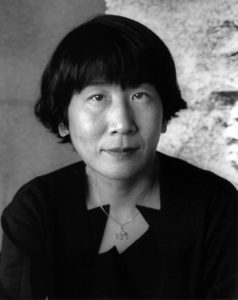BOOK REVIEW EDITOR ELLA KELLEHER WRITES – Society’s rejection of Takiko is not solely because of her sudden pregnancy at the tender age of twenty-one. It is Takiko’s unfettered commitment to herself and her happiness that causes her family and Japanese society to ostracize and condemn her. Takiko’s self-conviction is almost supernatural. She will go on after her pregnancy. Such an unabashed belief in oneself lends a deeper understanding to the reader: single parenthood is its own form of heroism.

Yūko Tsushima’s novel, Woman Running in the Mountains, originally debuted in its native Japanese in 1980. The book is written from the perspective of Takiko, a single woman in the early stages of motherhood. Many consider this tale to be a typical “I-novel” – a confessional type of story originating from the Japanese literary canon and narrated in the first person.
After a wonderous translation by Geraldine Harcourt and a much-needed rerelease, Tsushima’s novel has also been called a feminist work. Takiko chooses to have her baby while being young and unmarried in patriarchal 1970s Japan. Her emotionally destructive mother presses her to abort the child, while her abusive, alcoholic father beats and scorns her at every chance.
Why did this rerelease feel so necessary? Single parenthood may have lost some of its societal stigmas but nearly none of its hardships. The majority of single parents are women who statistically face greater issues getting a sufficiently supportive paycheck than their male counterparts, especially if the woman in question is in her early twenties. The uneasy balancing of professional and domestic labor conducted by single parents has only been exacerbated by the pandemic and an ensuing childcare crisis.
Takiko does not back down. Not even when her mother begs for an abortion at every given moment. “Who’d want to hire someone like you?” Her mother’s words sit like poison on the page. Not even after hearing such a remark does Takiko consider terminating her pregnancy. She is determined to live her life for herself and be independent. She strives for a decent job and a life away from her neighborhood’s prying eyes, vicious parents, and the very painful and real threat of destitution.

Perhaps one of the most powerful realizations made when reading the novel is that Takiko does not let her status of motherhood overwhelm her entire identity. She lives for herself too. This becomes especially clear when she eventually finds work at a plant nursery and meets an older, hardworking man named Kambayashi, who has a ten-year-old son with Down syndrome. “When I’m with him nothing else seems to matter…. He always shows exactly what he feels. So you can’t hold back yourself, can you?” Kambayashi explains, a look of pure bliss on his features.
Takiko is utterly bewildered by Kambayashi. She has never met a man who is as good a father as he. A man willing to devote his life to his child in a way that mirrors Takiko’s own dedication. She had ignorantly assumed that “every child who didn’t have to be called illegitimate must be blessed with a father and mother and perfect health.” Life and its seemingly endless “tragedies” are simply a matter of one’s perspective.
One day, Takiko discovers Kambayashi and other workers at the nursery are taking a trip to a nearby mountain to gather seedlings for the garden. After ample begging, Takiko is allowed to join in, and for the first time, she leaves her son in the care of her mother. On the mountain, Takiko meets a woman who made the uneasy choice to adopt a daughter. Learning about the experience of other types of parents revolutionizes Takiko’s perception of parenthood itself. In a moment of regained strength, she allows herself to long for a greater emotional connection with Kambayashi. When she’s finally alone with Kambayashi, she wishes that her body would “split apart, split in two and melt irretrievably into the rain and Earth.” Takiko yearns for a division between her motherly duties and her personal desire for passion. How often have parents wished for their parental and personal selves to be separate?
Takiko decides to name her child “Akira,” meaning “crystal,” using part of the word for “quartz.” One could argue that names somewhat pave a destiny for an individual. It is clear what Akira’s future will hold. Takiko does not intend for her son to be limited by his societal status of being an “illegitimate child,” a counterfeit of the “real thing.” To his mother, Akira is very much real in every sense. As real as an unbreakable gemstone. Akira, a diamond roughly carved out of society’s darkest caverns, is deserving of his own path in life.
As Takiko takes her child to her chest and images herself “running at top speed,” the two blend into an inspiring image. An undefeatable bond of mother and child, both with inexorable resolve to live life on their own accord. Woman Running in the Mountains is not only a beautiful read filled with rich, poetic imagery – it is also a necessary read. Step into the tattered shoes of a single mother whose life is somehow just as beautiful as it is harrowing.

Former LMU English Honors Graduate Ella Kelleher is the book review editor-in-chief and a contributing staff writer for Asia Media International. Her English studies featured a concentration in multi-ethnic literature. She is currently in Korea teaching English.


Thank you for this beautiful review. Made me tear up a bit thinking of my own life. Wonderful thank you again.